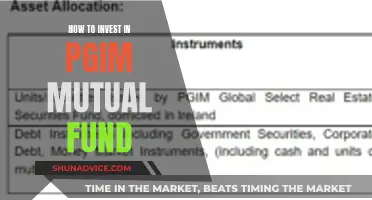
Private fund investments in private markets are a type of pooled investment vehicle (PIV) run by professional fund managers. They are a high-risk investment option, not open to retail investments, and are subject to local regulatory requirements that often restrict buyers to high-net-worth individuals or institutional investors. Private funds are not traded on public exchanges and consist of debt and equity instruments. Private funds are usually set up as limited partnerships, with at least one general partner and one limited partner. The general partner makes all the fund's management decisions and contributes 1-3% of the fund's capital. The limited partners are clients of the private equity firm and have limited liability. Private funds are typically hedge funds, private equity funds, real estate funds, or venture capital funds, each with distinct investment strategies and risk profiles.
What You'll Learn
- Private funds are a type of pooled investment vehicle (PIV) run by professional fund managers
- Private equity funds are one type of private fund
- Private equity funds are often grouped with venture capital and hedge funds as an alternative investment
- Private equity funds are typically structured as limited partnerships
- Private equity funds are regulated by the SEC and state securities agencies

Private funds are a type of pooled investment vehicle (PIV) run by professional fund managers
Private funds are considered investment companies under the Investment Company Act of 1940, a law that regulates the activities of investment companies in the United States. However, private funds can remain exempt from registration as investment companies if they follow the restrictions outlined in either Section 3(c)(1) or Section 3(c)(7) of the Investment Company Act. This exemption is what distinguishes a "private" fund from a "public" fund or registered investment company.
Private funds have a range of advantages and risks. They are generally regarded as riskier investments than public funds due to their illiquid nature, limited transparency, and limited regulatory oversight. However, they offer the potential for higher returns, portfolio diversification, and access to specialized opportunities.
There are several types of private funds, including hedge funds, private equity funds, real estate funds, and venture capital funds. Each type of private fund has a distinct investment strategy and risk profile. For example, hedge funds often use aggressive trading methods and invest in a wide variety of assets, while venture capital funds focus on providing funding for startups and early-stage companies.
Private funds have specific structures and are typically structured as limited partnerships, with at least one general partner (GP) and at least one limited partner (LP). The GPs and LPs can be individual people or legal entities, and their roles and responsibilities are spelled out in a limited partnership agreement (LPA).
Overall, private funds offer a unique investment opportunity for qualified investors, providing access to higher-risk, higher-reward opportunities that are not available to the general public.
Short-Term Bond Funds: Worth the Investment?
You may want to see also

Private equity funds are one type of private fund
Private equity funds are typically open only to accredited investors and qualified clients. Accredited investors and qualified clients include institutional investors, such as insurance companies, university endowments and pension funds, and high-income and net-worth individuals. The initial investment amount for a private equity investment is often very high.
Private equity funds are usually managed by a general partner (GP), typically the private equity firm that established the fund. The GP makes all of the fund's management decisions and contributes 1% to 3% of the fund's capital. In return, the GP earns a management fee, often set at 2% of fund assets, and may be entitled to 20% of fund profits above a preset minimum as incentive compensation, known in private equity jargon as carried interest.
Private equity funds can be further divided into two categories: venture capital and buyout or leveraged buyout. Venture capital funds are pools of capital that typically invest in small, early-stage and emerging businesses that are expected to have high growth potential but have limited access to other forms of capital. Leveraged buyout funds, on the other hand, invest in more mature businesses, usually taking a controlling interest. They use extensive amounts of leverage to enhance the rate of return.
Fidelity Zero Funds: Smart Investment or Risky Gamble?
You may want to see also

Private equity funds are often grouped with venture capital and hedge funds as an alternative investment
Private equity funds are often grouped with venture capital and hedge funds as alternative investments. This is because they are all considered alternative investment strategies that are typically active, return-seeking strategies with risk characteristics that differ from traditional long-only investments.
Private equity funds, venture capital, and hedge funds are also similar in that they are all private investment funds. Private investment funds are investment companies that do not solicit capital from retail investors or the general public. Members of a private investment company typically have deep knowledge of the industry, as well as investments elsewhere. Private investment funds are also not subject to the same regulatory and legal requirements as funds that are traded publicly.
However, there are some differences between private equity funds, venture capital, and hedge funds. For example, venture capital is often considered a subset of private equity, but its distinct function and skillset set it apart, giving rise to dedicated venture capital firms that dominate their sector. Venture capital firms also tend to invest in startups with high growth potential, whereas private equity firms tend to invest in mature companies. Hedge funds, on the other hand, focus on short-term profits and highly liquid assets, whereas private equity funds are focused on the long-term potential of the companies they invest in.
RRSP Investment Strategies: Where to Begin?
You may want to see also

Private equity funds are typically structured as limited partnerships
The other partners in a private equity fund are known as limited partners (LPs). These are the investors who supply the fund with capital. LPs are liable for up to the amount of money they invest, while GPs are fully liable to the market. LPs are typically institutional investors, such as pension funds, university endowments, insurance companies, and high-net-worth individuals.
The relationship between the GP and the LPs is governed by a limited partnership agreement (LPA). This outlines the fund's characteristics, such as duration, fees, and payout structure. It also stipulates the investment terms, including the types of investment the GP can consider, and any restrictions on the companies that can be included in the portfolio.
Private equity funds charge management and performance fees. The management fee is typically around 2% of the fund's assets and is charged even if the fund doesn't generate a positive return. The performance fee is a percentage of the profits generated by the fund, usually around 20%.
Money Market Funds: When to Invest for Maximum Returns
You may want to see also

Private equity funds are regulated by the SEC and state securities agencies
Private equity funds are a type of private investment fund. Private investment funds are investment companies that do not solicit capital from retail investors or the general public. Instead, they raise capital from investors through exempt offerings, which means the offering must fall within an exemption from registration under the Securities Act of 1933.
Private funds are not required to be registered or regulated as investment companies under federal securities laws. However, their managers remain subject to the Investment Advisers Act of 1940, as well as the anti-fraud provisions of federal securities laws. Private fund advisers are generally required to register with the SEC or applicable state securities regulators as registered investment advisers, unless they are exempt from applicable registration requirements.
In February 2022, the SEC proposed extensive new reporting and client disclosure requirements for private fund advisers, including those managing private equity funds. The new rules require private fund advisers registered with the Commission to:
- Provide investors with quarterly statements detailing fund performance, fees, and expenses
- Obtain and distribute to investors an annual financial statement audit of each private fund it advises
- Distribute a fairness opinion or valuation opinion in connection with an adviser-led secondary transaction
- Prohibit providing preferential treatment to investors regarding redemptions and information if it would have a material, negative effect on other investors
These rules are designed to protect private fund investors by increasing transparency, competition, and efficiency in the private funds market.
Oppenheimer Funds: Puerto Rico Debt Investment Status
You may want to see also
Frequently asked questions
Private markets refer to investments in debt or equity instruments that are not traded on public exchanges. Private markets consist of private debt and private equity components. Private market investments are subject to local regulatory requirements, which often restrict buyers to high-net-worth individuals or institutional investors.
Private markets can offer higher potential returns, diversification, access to a wider range of choices, and unique opportunities. However, they also come with higher risks, limited liquidity, longer return timelines, limited transparency, and limited regulatory oversight.
Examples of private funds include hedge funds, private equity funds, real estate funds, and venture capital funds. Each type of private fund has its own investment strategy and risk profile. Private funds are typically structured as limited partnerships with general partners (GPs) and limited partners (LPs).







